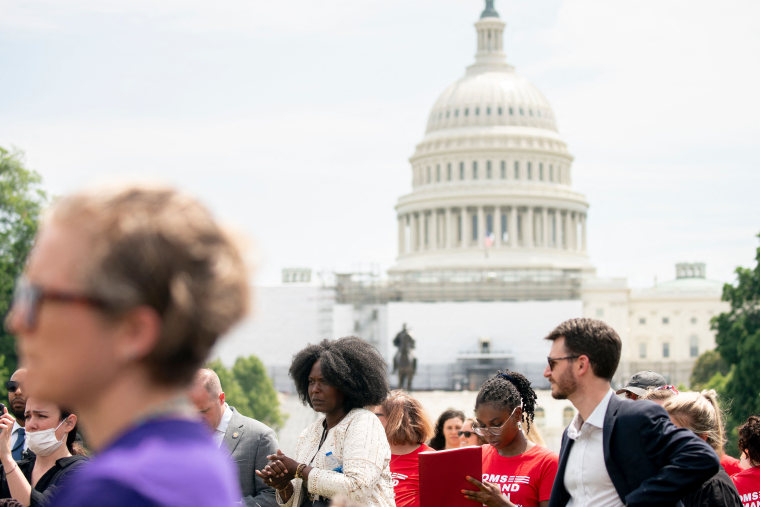It’s easy to forget, but the Democratic-led U.S. House passed worthwhile gun legislation early last year. In fact, it was just two months into the current Congress when the Democratic majority approved two bills, both of which related to expanding background checks on firearm purchases — one of the most popular policy proposals in the country.
Late yesterday, as NBC News reported, the House passed another.
The House on Wednesday passed a series of new gun measures, including a measure to raise the minimum age to buy semi-automatic rifles from 18 to 21, in response to a horrific spate of mass shootings across the country.... It now heads to the evenly split Senate, which is not expected to take up the legislation as negotiators seek to craft a much narrower measure designed to win enough bipartisan support to overcome a GOP filibuster.
The outcome was never really in doubt. The question was how large the margin of success would be.
In this instance, Republican leaders pressured members to oppose the package and the vast majority of GOP members followed the directions: The Protecting Our Kids Act passed 223 to 204, with only five Republicans voting in the majority: Pennsylvania’s Brian Fitzpatrick, Ohio’s Anthony Gonzalez, New York’s Chris Jacobs, Illinois’ Adam Kinzinger, and Michigan’s Fred Upton.
Four of these five are retiring — only Fitzpatrick is seeking re-election — and need not worry about a partisan backlash.
Meanwhile, two House Democrats — Maine’s Jared Golden and Oregon’s Kurt Schrader — opposed the measure. (Schrader lost in a primary last month.)
For reformers, the legislation was rather comprehensive, combining a series of other pending proposals into a single package. The Protecting Our Kids Act would:
- Raise the lawful age for buying assault rifles from 18 to 21 years old;
- Establish new federal offenses for gun trafficking and straw purchasing;
- Ensure that ghost guns are subject to existing federal firearms regulations;
- Establish gun storage regulations and award grants for firearm storage assistance programs;
- Ban the manufacture, sale, or possession of bump stocks for civilian use; and
- Ban the sale, manufacture, and illegal possession of gun magazines that hold more than 15 rounds of ammunition.
Given the partisan breakdown of yesterday’s vote, one might be tempted to think these ideas lack bipartisan appeal. That’s simply not the case: These measures all fit comfortably in the American mainstream; they’re all consistent with court rulings on gun regulations; they all poll well with the public; and most importantly, they might very well save some lives.
Roughly 98 percent of House Republicans balked anyway.
Making matters slightly worse, the Protecting Our Kids Act will land with a thud in the U.S. Senate, which has spent a few weeks negotiating a vastly narrower package.
As things stand, the scope of a possible Senate compromise includes new “red flag” laws, new money for mental health and school safety, some improvements to the existing background-check system — most notably by potentially including juvenile records in the system, as part of an effort to keep firearms away from youths with felony records.
That’s not much, but for Democratic senators involved in the negotiations, it’s generally seen as preferable to nothing.
As for when a modest agreement might come together, there were some hopes that senators would announce a breakthrough by Memorial Day. That was followed by chatter about a deal by the end of this week.
Yesterday on Capitol Hill, Republican Sen. John Cornyn of Texas, who’s playing a prominent role in the negotiations, said it’d be “reasonable” to expect an announcement of some kind “in the next couple of weeks.” Watch this space.

